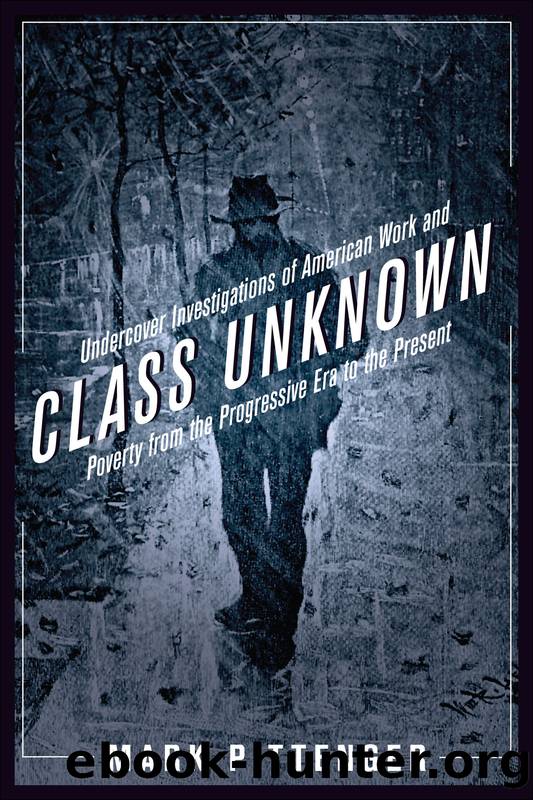Class Unknown by Mark Pittenger

Author:Mark Pittenger
Language: eng
Format: epub
ISBN: 9780814767405
Publisher: New York University Press
Published: 2012-08-15T00:00:00+00:00
The Greatest Divide: Science and Experience in Black Like Me
Since the 1890s, middle-class investigators had changed their clothes and plunged into the dark city; in 1959, a moderately successful white novelist blackened his skin with chemicals, a sun lamp, and dye, and then rode a New Orleans streetcar into the dark South. In doing so, John Howard Griffin brought to a culmination the process by which former class passers such as the fictitious Phil Green and the real Ray Sprigle had shifted their attention to religion and raceâwith the latter now defined almost exclusively by the line of color that divided black from white America. For Griffin, what Gunnar Myrdal had termed âthe American dilemmaâ was now American societyâs central problematic. It was, as he and some of his black interlocutors called it, simply âthe problem.â20 And in postwar public and academic minds, the problem was coming to overshadow and subsume the issue of class. Poverty, with its assumed pathologies, increasingly became synonymousâhowever inaccuratelyâwith blackness. As one reviewer of Black Like Me put it, Griffin had addressed âour number one social problem.â21
Like all previous down-and-outers, Griffin hoped to reshape public discourse by relying on the power of words to convey individual experience. More than any of his predecessors, he succeeded. His storyârecounted first in a 1960 series of articles for the black-oriented magazine Sepia, then in his 1961 book Black Like Me and in its 1964 Hollywood version, and later recurred to in various writings and speechesâseized the public imagination and catapulted the monastically inclined writer into a largely unwonted public role during the climactic years of civil rights and Black Power agitation.22 During those years, the postwar liberal universalism that had motivated and framed both Gentlemanâs Agreement and Black Like Me came under increasing scrutiny, resulting inâamong many other social and cultural changesâthe effective end of the classic era of undercover investigation. Griffinâs book pointed ahead to further experiments with identity, and to a continued cultural fascination with authentic experience, that would endure through the centuryâs close. But a heightened consciousness about the complexity of American identity, and a growing sensitivity to the perils of trying to speak for the other, reducedâthough they did not eliminateâthe appeal and the legitimacy of experiments in passing downward through the hierarchy of social power. Most later adventurers would neither seek nor find quite the same world of difference that had both enticed and repelled earlier generations of undercover explorers when they had set out to investigate poverty, work, and class in America.
While Griffinâs book presented itself as sui generis, it did culminate, if it did not precisely grow out of, a tradition of American texts concerned with racial passingâthe greater part of which, running from the nineteenth through the mid-twentieth century, addressed the phenomenon of African Americans passing as white. Yet the line could also be crossed in the other direction, especially as the domain of color had once been considerably larger.23 From the beginnings of the undercover tradition in the Progressive
Download
This site does not store any files on its server. We only index and link to content provided by other sites. Please contact the content providers to delete copyright contents if any and email us, we'll remove relevant links or contents immediately.
Tasting Mother-In-Law (Mother In Law Son In Law Erotic & Taboo Short Story) (Naughty In Law Book 3) by Rush Penny(401)
Carl Schmitt Between Technological Rationality and Theology by Hugo E. Herrera;(358)
EARLY GRAVE (Jake Lassiter Legal Thrillers Book 12) by Paul Levine(353)
The Love Conspiracy: An Age-Gap Lesbian Romance by Arias J.J(351)
The Rise of Critical Islam by Youcef L. Soufi(342)
HABEAS PORPOISE (Solomon vs. Lord) by Levine Paul(340)
If We Burn by Vincent Bevins(330)
Natural Rights on the Threshold of the Scottish Enlightenment by Unknown(328)
Democratic Quality in Southern Europe by Tiago Fernandes(323)
Tor and the Dark Net · Remain Anonymous Online and Evade NSA Spying (Tor, Dark Net, Anonymous Online, NSA Spying) by Smith James(318)
Toward revealing the controversy of bacterial biosynthesis versus bactericidal properties of silver nanoparticles (AgNPs): bacteria and other microorganisms do not per se viably synthesize AgNPs by Fatthy Mohamed Morsy(290)
Light-evoked depolarizations in the retina of <Emphasis Type="Italic">Strombus <Emphasis>: Role of calcium and other divalent cations by Unknown(278)
Women before the court by Lindsay R. Moore(249)
When Hope and History Rhyme by Douglas Burgess(228)
International Humanitarian Law and Justice by Mats Deland Mark Klamberg Pål Wrange(225)
To Raise and Discipline an Army by Joshua Kastenberg(220)
The Crimes of Womanhood by A. Cheree Carlson(220)
A New Daddy by orphan_account(217)
Witches, Wife Beaters, and Whores by Elaine Forman Crane(216)
